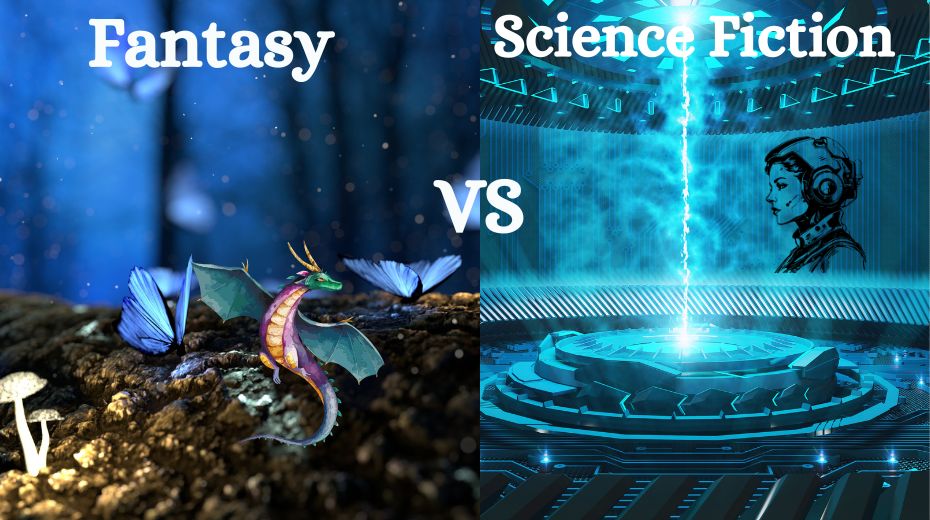Fantasy and science fiction are two of the most popular genres in books and movies. Both genres capture the imagination with unique worlds, extraordinary characters, and amazing possibilities. While they may seem similar, fantasy and science fiction have important differences that set them apart. Fantasy often includes magic, mythical creatures, and supernatural elements that break the rules of the real world. Science fiction, on the other hand, is based on science, technology, and logical ideas about the future. In this blog, we will explore the main differences between these two genres and help you understand why each one is special.
1. The Basis of Each Genre
The biggest difference between fantasy and science fiction is the foundation of their stories.
- Fantasy: Fantasy is all about imagination. It often draws from myths, legends, and folklore, including elements like magic, mythical creatures, and supernatural powers. These stories take place in made-up worlds that do not follow the rules of reality.
- Science Fiction: Science fiction is based on science and technology. It tells stories about what could happen in the future, based on new technology, scientific discoveries, and changes in society. Sci-fi often explores the potential future of humanity and uses science as the basis for its storytelling.
2. Setting and World-Building
Another important difference between these genres is the type of world they create.
- Fantasy: Fantasy settings are usually fictional worlds that are inspired by medieval times, with castles, kingdoms, and magical forests. These settings often include other realms or mystical locations where magic is real. Examples include J.R.R. Tolkien’s Middle-earth and George R.R. Martin’s Westeros.
- Science Fiction: Science fiction usually takes place in the future, in space, or on other planets. These settings are shaped by technology and scientific advancements, and they often include spaceships, futuristic cities, or alien planets. Examples include Isaac Asimov’s Foundation series and Arthur C. Clarke’s “2001: A Space Odyssey.”
3. Use of Magic vs. Technology
One of the biggest differences between fantasy and science fiction is how they use magic and technology.
- Fantasy: Fantasy stories rely on magic and supernatural elements. Magic can take many forms, like spells, enchanted objects, or mythical creatures. In fantasy, magic is just part of the world, and it doesn’t need a scientific explanation.
- Science Fiction: Science fiction focuses on advanced technology and scientific principles. The technology in sci-fi stories is often based on ideas that could be possible in the future. It might include things like space travel, artificial intelligence, or advanced robotics. Sci-fi is about exploring what might be possible through science and technology.
4. Themes and Ideas
Fantasy and science fiction both explore deep themes, but they do it in different ways.
- Fantasy: Fantasy often deals with themes like good versus evil, heroism, destiny, and power struggles. The magical elements of fantasy allow for symbolic storytelling, where these fantastical elements represent real-life issues like bravery, friendship, and the human condition.
- Science Fiction: Science fiction often explores themes related to technology, society, and the future. It can reflect concerns about things like climate change, artificial intelligence, or space exploration. Sci-fi encourages readers to think about the future and the effects of scientific progress on humanity.
5. Character Types
The types of characters found in each genre also show their differences.
- Fantasy: Fantasy usually features characters like heroes, wizards, mythical creatures, and royalty. The main character often goes on a quest or journey, guided by fate or a prophecy. Characters like Harry Potter, Frodo Baggins, and Aragorn are classic examples of fantasy heroes.
- Science Fiction: Science fiction focuses on characters like scientists, explorers, astronauts, or people who use their intelligence to solve problems. These characters may be motivated by curiosity, the desire to innovate, or the need to survive. Examples include Ellen Ripley from “Alien,” Paul Atreides from “Dune,” and Ender Wiggin from “Ender’s Game.”
6. Laws of the Universe
Fantasy and science fiction have different relationships with the rules of the universe.
- Fantasy: In fantasy, the rules of the universe can be flexible. Magic, mythical creatures, and divine intervention often mean that the laws of physics can be broken. Characters can do things that are impossible in the real world.
- Science Fiction: Science fiction usually sticks more closely to the known laws of science and physics. Even though the technology and scientific advancements in sci-fi may not yet exist, they are presented as theoretically possible. This gives sci-fi a sense of realism, even when dealing with extraordinary concepts.
7. Audience Expectations
The audiences for these genres have different expectations.
- Fantasy: Readers of fantasy want to be transported to a magical world where anything is possible. They expect to see characters that represent timeless ideas of heroism and adventure. Fantasy offers an escape from the real world, allowing readers to experience something extraordinary.
- Science Fiction: Sci-fi audiences are drawn to stories that challenge their understanding of the world and make them think about the future. They expect the story to have a sense of realism, with technology and science playing a central role. Sci-fi fans enjoy thinking about potential futures and the ethical questions that come with scientific discoveries.
Conclusion
Fantasy and science fiction are two amazing genres that offer unique experiences for readers and viewers. While both involve imaginative storytelling, they are different in how they create their worlds, use magic or technology, and explore themes. Fantasy takes us to magical places filled with wonder, while science fiction invites us to think about the future and the possibilities that science holds. Understanding these key differences can help you enjoy both genres even more. Whether you prefer the escapism of a magical world or the thought-provoking ideas of a futuristic society, both genres have something incredible to offer.
